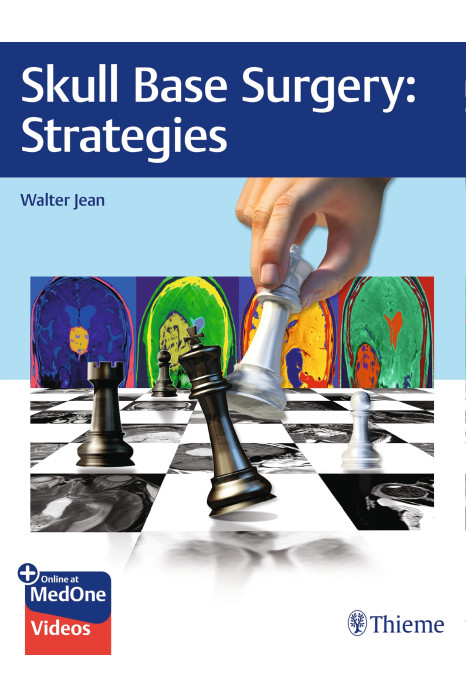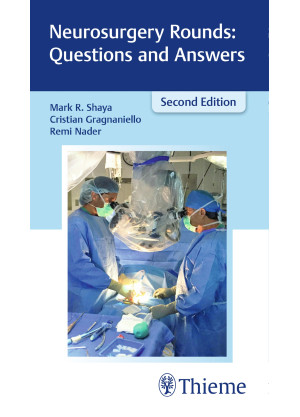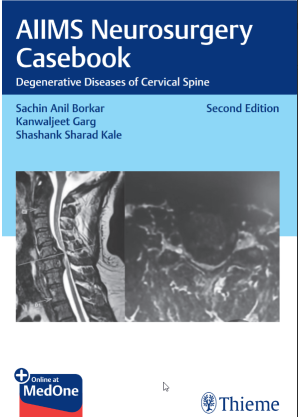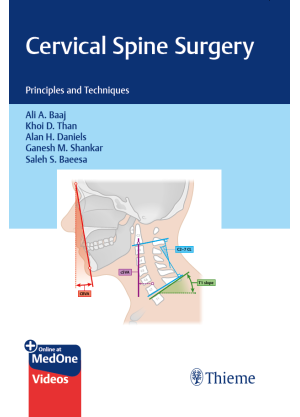Unique skull-base surgical resource features strategic, technical, and philosophical pearls from master surgeons
In a sense, surgeons go into battle every time they enter the OR. Like soldiers, they must be prepared to make profound sacrifices to protect innocent people (their patients), while putting egos aside and resisting the call of fame. Skull Base Surgery: Strategies by Walter Jean and distinguished contributors provides eloquent expression to the inner voices that speak to surgeons during each stage of battle. Unlike other textbooks that only emphasize the technical building blocks surgeons need, this resource focuses on state-of-the-art skull-base procedures, important thought processes, and vital strategies required to perform them.
Size and shape variations, diverse biological characteristics, different anatomic locations and extensions, and specific relationships and entanglements with nerves and vessels make all skull base tumors unique and highly challenging. In addition to anatomy, two other important factors need to be considered every time a surgeon enters the OR – the particular circumstances of the patient and surgeon. Throughout this remarkable book, master neurosurgeons take readers on an insightful journey exploring the decision-making process of choosing and executing a surgical approach, with firsthand pearls from the battlefield.
Key Highlights
- Nine sections organized by anatomy cover tumors in the anterior, anterolateral, lateral, central, postero-superior, and postero-inferior skull base regions, and clivus, petrous bone, and ventricles
- Thirty-two systematically organized chapters flow from clinical presentation and radiographic/anatomical findings of specific patients and tumors – to decision-making and execution of the surgical approach
- Real-life cases enhance understanding of all the elements that go into each operation
- Perspectives sections at the end of each chapter embrace the concept of diverse surgeon viewpoints on similar ideas, techniques, and approaches
This exemplary book is essential reading for neurosurgery and otolaryngology residents, fellows, veteran practitioners, and allied health personnel who care for patients with skull base tumors.
This book includes complimentary access to a digital copy on https://medone.thieme.com.
Part I Tumors of the Anterior Skull Base
1 Tuberculum Sella
2 Olfactory Groove
3 Nasopharynx and Pterygopalatine Fossa
Part II Tumors of the Anterolateral Skull Base
4 Anterior Clinoid
5 Juxtasellar Cisterns
6 Cavernous Sinus
Part III Tumors of the Lateral Skull Base
7 Meckel's Cave
8 Tentorial Incisura
9 Mesial Temporal Lobe
Part IV Tumors of the Central Skull Base
10 Dorsum Sella
11 Suprasellar
12 Posterior Clinoid
Part V Tumors Around the Clivus
13 Petroclival
14 Spheno-Caverno-Petroclival
15 Petroclival Fissure
16 Foramen Magnum
17 Craniovertebral Junction
Part VI Tumors Around the Petrous Bone
18 Petrotentorial Junction
19 Cerebellopontine Angle
20 Jugular Foramen (Intracranial)
21 Jugular Foramen (Intra- and Extracranial)
Part VII Tumors of the Posterosuperior Skull Base
22 Falcotentorial
23 Superior Vermis
24 Pineal
Part VIII Tumors of the Posteroinferior Skull Base
25 Brainstem (Pontomesencephalic)
26 Brainstem (Pontomedullary)
27 Cerebellomedullary Fissure
28 Torcula
Part IX Tumors of the Ventricles
29 Lateral Ventricle (Monro)
30 Lateral Ventricle (Atrium)
31 Third Ventricle
32 Fourth Ventricle
Video Contents
Video 1.1 Anatomical relationships of a tuberculum sellae meningioma.
Video 2.1 Endoscopic endonasal approach to the anterior fossa.
Video 4.1 Anatomical relationships of an anterior clinoid meningioma.
Video 5.1 Anatomical relationships of a large juxtasella epidermoid cyst.
Video 6.1 Anatomical relationships of a cavernous sinus meningioma.
Video 6.2 Extended middle fossa approach with anterior clinoidectomy and petrosectomy.
Video 7.1 Middle fossa craniotomy with anterior petrosectomy.
Video 9.1 Endoscopic supracerebellar transtentorial approach.
Video 10.1 Endoscopic endonasal approach to the dorsum sellae and third ventricle.
Video 10.2 Transcallosal, transchoroidal approach to the third ventricle.
Video 13.1 Combined (anterior and posterior) petrosal approach.
Video 13.2 Endoscopic endonasal transclival approach.
Video 20.1 Endoscopic-assisted retrosigmoid keyhole approach to the jugular foramen.
Video 21.1 Anatomical relationships of a glomus jugulare tumor.
Video 21.2 Microsurgical re-anastamosis of the facial nerve.
Video 25.1 Contralateral interhemispheric transtentorial approach.
Video 26.1 Far lateral approach to the pontomedullary junction.
Video 27.1 Subtonsillar approach to the cerebellomedullary fissure.
Video 32.1 Telovelar approach to the floor of the fourth ventricle.
Video 32.2 Telovelar approach to the fourth ventricle.











